#abnormal psychology
Text
Survivors of domestic violence: narcissistic abuse is real.
Survivors of childhood violence: narcissistic abuse is real.
Survivors of emotional and psychological abuse: narcissistic abuse is real.
Loved ones of survivors: narcissistic abuse is real.
Therapists specialising in abuse recovery: narcissistic abuse is real.
Experts in abnormal psychology: narcissistic abuse is real.
People with CTPSD: narcissistic abuse is real.
Psychologists studying the effect of long term abuse on the brain: narcissistic abuse is real.
People with diagnosed cluster B disorders: narcissistic abuse is real.
Disabled people who are more likely to be abused than abled people: narcissistic abuse is real.
The therapy prescribed to people diagnosed with cluster B disorders: narcissistic abuse is real.
Self identified "narcissists" on tumblr: nuh-uh.
#narcissistic abuse#narcissisticgaslighting#narcissism is not npd#narcissistic abuse is not real#narcissistic abuse is real#abnormal psychology#narcissistic abuse awareness#narcissistic abuse survivor#cpstd#narcissistic abuse recovery#abuse recovery
134 notes
·
View notes
Text




05.30.23
tonight, i'm studying abnormal psychology. a few years ago, while in college, i made a comprehensive table summary of the dsm-5. i've been using it to brush up on my knowledge and understanding of mental disorders ever since.
so, here's my messy, messy desk for tonight :) i also got my drawing tablet out bc i just finished doing a commission hehe :3
#studyblr#academia#gradblr#psych#study#aesthetic#psych student#psychology#abnormal psychology#dsm 5#psychblr#desk#desk tour#desk ideas#worktable#desk setup
113 notes
·
View notes
Text
I've been thinking of changing the way I view personality disorders by separating it into a "core" (inner world experience) and "adaptations" (behaviors) view, because the current DSM-5 model just treats it as if the adaptations are signs of the core, and I don't think that's necessarily true
Lacking empathy could be a sign of many personality disorders, but if it's because of an inner sense of superiority compensating for a deeper sense of inferiority it would be a narcissistic core, regardless of how many "narcissistic adaptations" it would present with, for example
Like if a person shuts down when presented with others' issues and becomes detached and cold when responding to it, with the inner belief/thought process that "they're detracting from me being the center of attention and admiration" and just goes quiet, you might consider that a schizoid adaptation to a narcissistic core under this approach
Though I'm just a highschool student who reads a lot with no professional training or experience or any data to back up if this would be useful in any way. It's just an idea to throw out there
#graypost#grayrambles#personality disorder#narcissistic personality disorder#schizoid personality disorder#low empathy#no empathy#npd#szpd#psychology#abnormal psychology
33 notes
·
View notes
Text
Traumatic Events
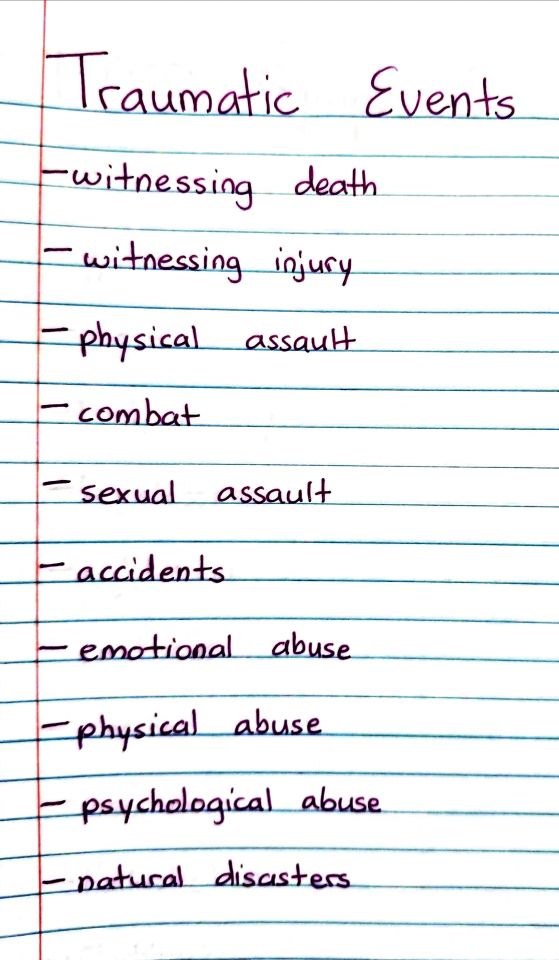
Patreon
#studyblr#notes#medblr#medical notes#med notes#psychology#psychology notes#psych#psych notes#psychiatry#psychiatry notes#abnormal psychology#abnormal psych#human psychology#human psych#trauma#trauma psychology#mental health
9 notes
·
View notes
Text

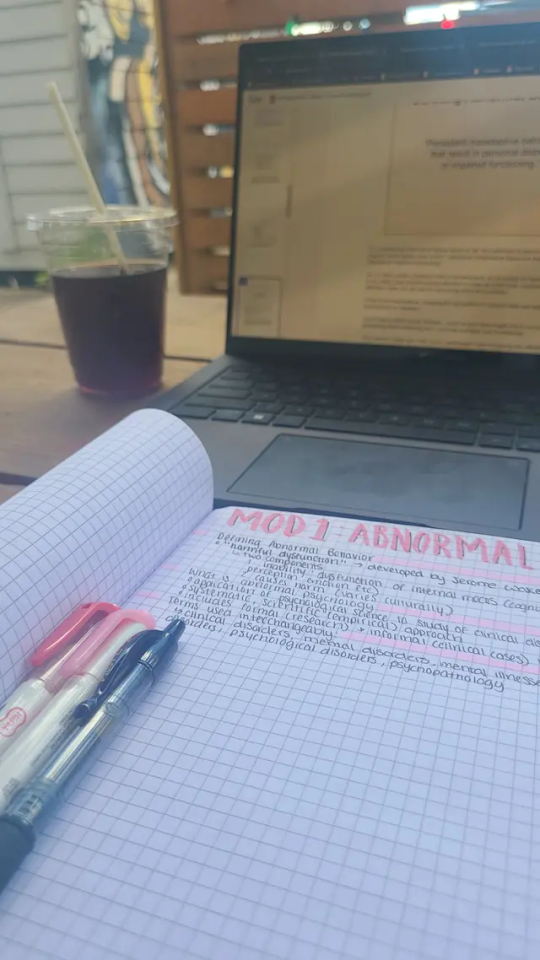
Coffee shop study session - sometimes you just need a different study spot. I love using novel spaces as a way to help stay focused.
#studyblr#studyspo#coffee#adhd study tips#adhd tips#stemblr#psychology#study hard#study tips#studying#study#study aesthetic#student#study blog#study motivation#studyspiration#abnormal psychology#school#desk aesthetic#aesthetic
15 notes
·
View notes
Text
Currently working on putting together a whole bunch of info regarding dissociation theory and phenomenology into a powerpoint because my family wants to learn about it, but I'm definitely gonna share it here once I've finished it!
#dissociation#dissociative identity disorder#complex dissociative disorder#trauma#trauma recovery#trauma related#psychology#abnormal psychology#structural dissociation#theory of structural dissociation#attachment theory#attachment trauma#attachment styles#betrayal trauma#phenomenology#traumagenic did#traumagenic osdd#traumagenic system#trauma theory#perceptual theory#perception theory#neuropsychology#complex ptsd#complex post traumatic stress disorder#ptsd#bpd#borderline personality disorder#complex trauma#actually dissociative#psychology presentation
13 notes
·
View notes
Text
I'm writing a paper for one of my classes right now, and basically I have to pick an abnormal psych topic from the first half of the semester and explain it before relating it to a piece of media that portrays it or talks about it. Then I get to either praise or destroy it for being either accurate or inaccurate.
I've chosen autism since the first half of the semester covered neurodevelopmental disorders, but I can't quite decide on the media I want to destroy. I thought about doing a good one, but I always seem to have more to say about the bad ones and I need to fill at least four pages here.
I'm thinking maybe Music? The trailer looks bad honestly, and I know that a nt or doctor very well might not be able to see the difference between the main actress and an actual autistic person, but seeing a neurotypical person playing an autistic person gives me the same crawly skin feeling as uncanny valley does. I also had a friend recommend Temple Grandin if I wanted more positive representation, and I was considering Atypical myself. Atypical has pretty good reviews, but I watched a few episodes back when it first came out and it made me so incredibly uncomfortable. I'm not sure if it made me uncomfortable because it was bad representation or if it made me uncomfortable because I'm aroace-spec and all romance focused plots make me fairly uncomfortable, but it did either way.
I'll figure something out tn because the paper is due the 3rd, and while I trust my ability to write a 4 page paper in under three hours, I don't trust my ability to find a media source and watch it thuroughly in three days.
#neurodivergent#autism#college student#psychology#abnormal psychology#essay writing#autism representation#autism in media
2 notes
·
View notes
Text
#abnormal psychology#psychic#book of shadows#grimoire#art therapy#social psychology#psychology#sociology#witchcraft#sorcery
2 notes
·
View notes
Text
Psychopathology, Ch 2 pt. 2
Describe the key features of psychodynamic models of abnormal behavior and evaluate their major contributions.
Psychoanalytic theory: the theoretical model of personality developed by Sigmund Freud, based on the belief that psychological problems are rooted in unconscious motives and conflicts from childhood; also called psychoanalysis.
Conscious: to Freud, the part of the mind that corresponds to our present awareness.
Preconscious: to Freud, the part of the mind whose contents lie outside present awareness but can be brought into awareness by focusing on them.
Unconscious: to Freud, the part of the mind that lies outside the range of ordinary awareness and that contains instinctual urges.
Id: the unconscious psychic structure, present at birth, that contains primitive instincts and that is regulated by the pleasure principle.
Pleasure principle: the governing principle of the id, involving demands for immediate gratification of needs.
Ego: the psychic structure that corresponds to the concept of the self, governed by the reality principle and characterized by the ability to tolerate frustration.
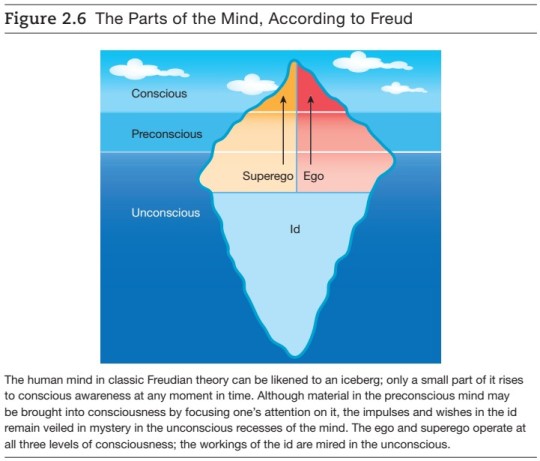
Reality principle: the governing principle of the ego, which involves considerations of social acceptability and practicality.
Superego: the psychic structure that incorporates the values of our parents and important others and functions as a moral conscience.
Defense mechanisms: the reality-distorting strategies used by the ego to shield the shelf from awareness of anxiety-provoking impulses.
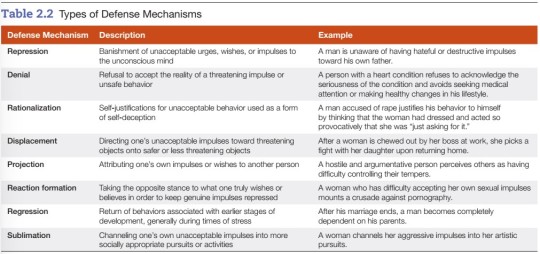
Fixation: in Freudian theory, a constellation of personality traits associated with a particular stage of psychosexual development, resulting from either too much or too little gratification at that stage.
Other Psychodynamic Theorists
Carl Jung (1875-1961) - Swiss psychiatrist, developed analytical psychology. Believed an understanding of human behavior must incorporate self-awareness and self-direction as well as impulses of the id and mechanisms of defense. Believed that we have a personal unconscious, but also that we inherit a collective unconscious. The collective unconscious contains archetypes: primitive images or concepts that reside in the collective unconscious.
Alfred Adler (1870-1937) - broke away from Freud because he believed people are basically driven by an inferiority complex, not by the sexual instinct. These feelings of inferiority lead to a powerful drive for superiority, which motivates us to achieve prominence and social dominance. In the healthy personality, those struggles for dominance are tempered by a desire to help other people. Adler spoke of a creative self, a self-aware aspect of personality that strives to overcome obstacles and develop potential. Because our potentials are uniquely individual, Adler's theories have been called individual psychology.
Karen Horney (1885-1952) - stressed the importance of child-parent relationships in the development of emotional problems. Horney believed that when parents are harsh or uncaring, children develop a deep-seated form of anxiety called basic anxiety, a feeling of "being isolated and helpless in a potentially hostile world." Children may also develop a form of hostility called basic hostility. With Horney and other psychodynamic theorists who followed Freud, the emphasis shifted from a focus on sexual & aggressive drives toward a closer examination of social influences on development.
Today, most psychoanalysts see people as motivated on two tiers: by the growth-oriented conscious pursuits of the ego, and by the more primitive conflict-ridden drives of the id. Heinz Hartmann (1894-1970) was one of the originators of ego psychology, which posits that the ego has energy and motives of its own.
Erik Erikson (1902-1994) - focused on psychosocial development, in contrast to Freud's emphasis on psychosexual development. Erikson attributed more importance to social relationships and formation of personal identity than to unconscious processes. Erikson's developmental theory, beginning in early adolescence, posits that our personalities continue to be shaped throughout adulthood as we deal with the psychosocial challenges or crises we face during each phase of life.
Margaret Mahler (1897-1985) - developed object-relations theory, focused on how children come to develop symbolic representations of important others in their lives, especially their parents. According to this theory, we incorporate parts of parental figures in our lives into our own personalities, and when we fear losing those people through rejection or death, we might incorporate elements of other people who disapprove of us or have perspectives that conflict with our own. The aim of Mahler's therapeutic approach was to help clients separate their own ideas and feelings from those of the incorporated objects so they could develop as individuals.
Psychosis: a severe form of disturbed behavior characterized by impaired ability to interpret reality and difficulty meeting the demands of daily life.
Evaluating Psychodynamic Models
culturally influential
generally agreed that people can have hidden motives even they may not be aware of
Freud placed too much emphasis on sexual & aggressive impulses and under-emphasized social relationships.
Freud's hypothetical mental processes are not scientific concepts because they cannot be directly observed or tested.
There IS a growing body of scientific evidence that supports the existence of unconscious processes that lie outside ordinary awareness.
Describe the key features of learning-based models of abnormal behavior and evaluated their major contributions.
Behaviorism: the school of psychology that defines psychology as the study of observable behavior and that focuses on the role of learning in explaining behavior.
Conditioned response (CR): in classical conditioning, a learned response to a previously neutral stimulus.
Unconditioned stimulus (US): a stimulus that elicits an unlearned response.
Unconditioned response (UR): an unlearned response.
Conditioned stimulus (CS): a previously neutral stimulus that evokes a conditioned response after repeated pairings with an unconditioned stimulus that had previously evoked that response.
Classical conditioning: a form of learning in which a response to one stimulus can be made to occur in response to another stimulus by pairing or associating the two stimuli.
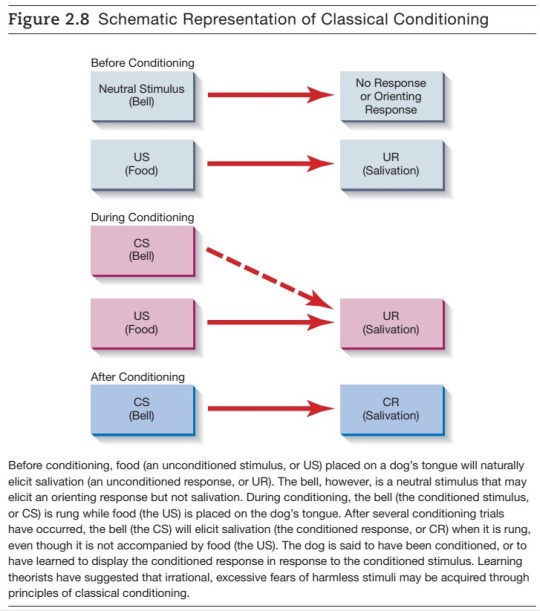
Operant conditioning: a form of learning in which behavior is acquired and strengthened when it is reinforced.
Reinforcement: a stimulus or event that increases the frequency of the response that it follows.
Positive reinforcers: reinforcers that increase the frequency of the preceding behavior when introduced.
Negative reinforcers: reinforcers that increase the frequency of the preceding behavior when removed.
Punishment: application of aversive or painful stimuli that reduces the frequency of the behavior it follows.
Social-cognitive theory: a learning-based theory that emphasizes observational learning and incorporates roles for cognitive variables in determining behavior.
Modeling: (1) learning by observing and imitating the behavior of others; (2) in behavior therapy, a treatment technique for helping an individual acquire a target behavior by observing a therapist or another individual demonstrate the target behavior and then imitating it.
Expectancies: beliefs about expected outcomes.
Evaluating Learning Models
spawned behavior therapy (AKA behavior modification) that involves systematically applying learning principles to help people change their undesirable behavior
behavioral therapies tend to be effective for depression, anxiety disorders & phobias, sexual dysfunction, and more
reinforcement-based programs are useful to parents and teachers
critics point out that human experience cannot be reduced to observable responses
social-cognitive theorists are particularly dissatisfied with the view that rewards and punishments control our behavior; thoughts and dreams and goals and aspirations are not accounted for
critics of social-cognitive theory might say that it places too little emphasis on genetic contributions to behavior and doesn't provide a full enough account of subjective experience
Describe the key features of humanistic models of abnormal behavior and evaluate their major contributions.
Self-actualization: in humanistic psychology, the tendency to strive to become all that one is capable of being; the motive that drives one to reach one’s full potential and express one’s unique capabilities.
Unconditional positive regard: valuing other people as having basic worth regardless of their behavior at a particular time.
Conditional positive regard: valuing other people on the basis of whether their behavior meets one’s approval.
According to humanists, we cannot fulfill all the wishes of others and remain true to ourselves. However, this does not mean that self-actualization invariably leads to conflict. Rogers believed that people hurt one another or become antisocial in their behavior only when they are frustrated in their efforts to reach their unique potentials. When parents and others treat children with love and tolerance, children also grow up to be loving and tolerant, even if some of their values and preferences are different from their parents' choices.
The goals of client-centered therapy or person-centered therapy are self-discovery, self-acceptance, getting in touch with one's true feelings, accepting them as one's own, and acting in ways that genuinely reflect those feelings.
Evaluating Humanistic Models
brought concepts of free choice, inherent goodness, personal responsibility, and authenticity into modern psychology
because conscious experience is private & subjective, it's difficult to quantify and study objectively
Maslow & Rogers' concept of self-actualization is not directly measurable or observable; it's inferred from its superimposed effects
Describe the key features of cognitive models of abnormal behavior and evaluate their major contributions.
Cognitive theorists study the thoughts, beliefs, expectations and attitudes we use to understand the world around us. They focus on how inaccurate or biased processing of information about the world can create abnormal behavior. Cognitive theorists believe that distorted interpretations or judgments about the events in our lives (not the events themselves) determine the likelihood of developing emotional problems.
Albert Ellis developed rational-emotive behavior therapy (REBT) to help people dispute their irrational beliefs and substitute more rational ones.
Aaron Beck developed cognitive therapy, and stressed four basic types of cognitive distortions that contribute to emotional distress:
Selective abstraction - People may focus exclusively on the parts of their experiences that reveal their flaws and ignore evidence of their competencies.
Overgeneralization
Magnification
Absolutist thinking
Evaluating Cognitive Models
The overlap between learning-based and cognitive approaches is best represented by the emergence of cognitive-behavioral therapy, a form of therapy that focuses on modifying both self-defeating beliefs and overt behaviors.
CBT is not particularly helpful for more "severe" mental illnesses, such as schizophrenia.
It's unclear whether distorted thinking patterns are caused by depression or are effects of depression.
The Sociocultural Perspective
The sociocultural perspective proposes that a fuller accounting of abnormal behavior requires that we consider social and cultural factors, including factors related to ethnicity, gender, and social class. Sociocultural theorists seek causes of abnormal behavior in the failures of society rather than in the person. Some of the most radical sociocultural theorists even deny the existence of psychological disorders or mental illness.
Evaluate ethnic group differences in rates of psychological disorders.
Knowing that a disorder disproportionately affects one group or another can help planners direct prevention and treatment programs to the groups that stand to benefit most.
In general, as incomes increase, the risk of serious psychological disorders decreases, a trend that points to the effects of financial stress on mental well-being (Weissman et al., 2015). People with household incomes near or below the poverty line stand a higher risk of developing serious psychological disorders, including mood disorders and substance use disorders, than those with higher incomes (Sareen et al., 2011; Weissman et al., 2015).
Exposure to racism, discrimination, and oppression is also a significant source of stress to ethnic minorities, and that can take a toll on mental health (Chavez-Duenas et al., 2019; Hartmann et al., 2019). [Note: does anyone know how I can add the ~ over an "n"? I'm not on mobile.]
We also need to account for differences among ethnic subgroups. For example, depression is more prominent among Hispanic immigrants to the United States from Central America than from Mexico, even when considering differences in educational backgrounds (Salgado de Snyder, Cervantes & Padilla, 1990).

Black and Hispanic Americans actually have lower rates of current (past year) psychological disorders or mental illness than white (European) Americans. Asian Americans also generally show lower prevalence rates than the overall US population (Kim & Lopez, 2014; Ryder et al., 2013; Sue et al., 2012). However, when it comes to the chronicity of psychological disorders, Hispanic and Black Americans typically develop more persistent or chronic mental disorders than white/European Americans (Breslau et al., 2005).
Additional analysis showed that differences in persistence of disorders were not a function of socioeconomic level (Breslau et al., 2005). However, white adults are about twice as likely - compared to Black or Hispanic Americans - to use mental health services, with factors relating to cost and lack of access to insurance coverage most often reported as reasons for lower use among racial or ethnic minorities (SAMSHA, 2015). It is conceivable that better access to mental health care may help shorten the duration of psychological disorders.
American Indians - and Native Hawaiians, and Alaska Natives - experience high rates of mental disorders, such as depression and substance use disorders (Gone et al., 2019; Nelson & Wilson, 2017; Skewes & Blume, 2019). They also happen to be among the most impoverished ethnic groups in the United States & Canada. High levels of stress and poverty among Natives living on tribal reservations are certainly among the factors contributing to a greater prevalence of depression (Kaufman et al., 2013).
Rates of substance use disorders among American Indians & Alaska Natives are more than double those of the general population (Skewes & Blume, 2019). The death rate due to suicide among 10-14 year olds is about four times higher for Natives than other ethnic groups. Native boys and young men have the highest suicide rates in the nation (USDHHS, 1999).
Native Hawaiians tend to die at a younger age than other residents of Hawaii, largely because they face an increased risk of serious diseases, including hypertension, cancer, and heart disease (Johnson et al., 2004). They also show higher rates of risk factors associated with these diseases, such as smoking, alcohol abuse, and obesity. Compared to other Hawaiians, Native Hawaiians also experience higher rates of mental health problems, including higher suicide rates among men, higher rates of alcoholism and drug abuse, and higher rates of antisocial behavior.
The mental health problems and economic struggles of Native peoples are, at least partially, a reflection of the alienation from their lands and erasure of their lifeways that resulted from European colonization (Gone et al., 2019; Rabasca, 2000).
Evaluate the sociocultural perspective in our understanding of abnormal behavior.
Social causation model: holds that people from lower socioeconomic status groups are at a greater risk of severe behavior problems because living in poverty subjects them to a greater level of social stress than that faced by more well-to-do people (Costello et al., 2003; Wadsworth & Achenbach, 2005).
Downward drift hypothesis: suggests that problem behaviors lead people to drift downward in social status, thereby explaining the link between low socioeconomic status and severe behavior problems.
The Biopsychosocial Perspective
examines contributions of multiple factors spanning biological, psychological, and sociocultural domains, as well as their interactions, in the development of psychological disorders
biological influences more prominent for schizophrenia, bipolar disorder, and autism (for example)
for anxiety and depression, there is a more intricate relationship between biological, psychological, and environmental factors

Describe the diathesis-stress model of abnormal behavior.

diathesis-stress model: holds that certain psychological disorders arise from a combination or interaction of...
a diathesis: vulnerability or predisposition to developing the disorder, usually genetic in nature
stressful life experiences
Whether a disorder actually develops depends on the nature of the diathesis and the type + severity of stressors the person experiences in life. The life stressors that may contribute to the development of disorders include birth complications, trauma or serious illness in childhood, childhood sexual or physical abuse, prolonged unemployment, loss of loved ones, or significant medical problems (Jablensky et al., 2005).
The stronger the diathesis, the less stress is generally needed to trigger the disorder. In some cases, the diathesis may be so strong that the disorder develops even under the best life circumstances.
A diathesis or predisposition is usually genetic in nature, but it could also take other forms. Ex. the tendency to blame oneself for negative life events that are not totally within one's control may put a person at greater risk of developing depression as a response to those events.
Evaluate the biopsychosocial perspective on abnormal behavior.
With few exceptions, psychological disorders or other patterns of abnormal behavior are complex phenomena arising from multiple causes.
Different people may develop the same disorder for different reasons.
11 notes
·
View notes
Text
disclaimer: i know nothing about erotic fanfics.
What I don't get...... is if one has been writing erotic TK fan fiction for a very long time, why the FUCK are they not particularly interested in the possibilities when the dude gets involved with one of the most glamorous, attractive celebrities in the world.
4 notes
·
View notes
Text
How To Handle A Stalker
What To Do If You’re Being Stalked
View On WordPress
2 notes
·
View notes
Conversation
Jimmy Reed: On 'Mentally Unhealthy'
Question: 'Mentally unhealthy' is such a vaguely defined term, I think people simply use it as an excuse to try to curb eccentricity.
Jimmy Reed: I think you're right, my lovely. If there are mountains of evidence proving that certain behaviours are harmful, that's one thing - but, even in those cases, it's not something we should be forceful about... providing, of course, that it's not harmful to other people. It ought to be mentioned that even supposedly 'normal behaviour' has a potential to be psychologically harmful. Maybe we ought to just let people live, and life is all about taking risks.
#jimmy reed#Blues#society#sociology#psychology#Harm Principle#John Stuart Mill#abnormal psychology#abnormal behavior#abnormal behaviour#antiauthoritarian#anarchism
2 notes
·
View notes
Text
It's fucking wild to me that I can get a career, solely because I read books.
Like...I'm gonna apply to the fbi when I graduate.
And what qualifies me for that?
I READ SOME FUCKING BOOKS.
#college#degree#books#fbi#career#behavioral science#bachelors degree#borderline personality disorder#sociology#psychology#criminal law#adolescent development#abnormal psychology
2 notes
·
View notes
Text
senior year
Sep. 6th, 2022; 09h35
senior year senior year senior year!!!!
WAHOO WE MADE IT somehow through covid (which is still going on) and through mental illness (which is much more under control) and AAAAA college has been a ride but only 2 semesters left wahoo!!!
classes for this fall (are so good and i'm so excited)
depression seminar
anxiety and ocd seminar
abnormal psychology
economics of education
literature of the bible
eeeee! i'm feeling excited:):)
going to also be applying to graduate school this semester; I want a PsyD, so applying to places that give out that degree! I'll be taking the Psychology GRE at the end of october, so studying for that this month and next... not too stressed about it all at the moment, just really really excited to finally be getting closer to doing something for my future, rather than just planning it in the distance:)
i hope school is starting off alright for all of you!! <3 ask box as usual is always open if you want any pats on the head or labelled praises for just existing or whatever you might like <3
#psychology#psychblr#studyblr#uni#university#college#depression#anxiety and ocd#abnormal psychology#economics of education#literature of the bible#classes#class list#senior year#psyd#psyd application#gre#gre psychology#ich
2 notes
·
View notes
Text
youtube
In my never-ending pursuit of total annihilation of conservative propaganda, I go after this CHUD veteran from Los Angeles. California. He allegedly suffers from covert narcissism, and I point it out.
2 notes
·
View notes
Text
Really showing some self restraint here, I feel. Going back and fourth back and fourth. Should We? Shouldn’t We? We want to try to clear up psychosis and also not make it worse. We are taking the smallest dose of lsd We think We’ve taken since We started Psychedelic Therapy. About 100mcg. Teen wanted to do 200mcg but Brother actually talked him out of it. He said just to do a little for medicine. Basically that’s what he was saying. But yeah, today We walked to the store by ourself (bad idea) everything went relatively fine but when We got home and went to unlock our door We got freaked out. We swore someone had come up the stairs behind us but there was no one. Then it felt like they kept sneaking up behind us. There wasn’t anyone there. We will see if this dose makes a difference.
#psychedelic therapy#5-21-22#DID journal#journal#symptom documentation#symptom progression#psychosis#self medication#Dissociative diary#DID on LSD#Plurality#plural#Plural Pride#endogenic safe#tulpa safe#dissociative identity disorder#abnormal psychology#experimental psychology#Animal#Brother#The Gobos
2 notes
·
View notes